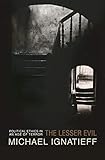The Lesser Evil : Political Ethics in an Age of Terror / Michael Ignatieff.
Material type: TextPublisher: Princeton, NJ : Princeton University Press, [2013]Copyright date: ©2004Description: 1 online resource (232 p.)Content type:
TextPublisher: Princeton, NJ : Princeton University Press, [2013]Copyright date: ©2004Description: 1 online resource (232 p.)Content type: - 9780691123936
- 9781400850686
- International relations -- Moral and ethical aspects
- Political ethics
- Terrorism
- PHILOSOPHY / Political
- Accountability
- Al-Qaeda
- Appeasement
- Assassination
- Authoritarianism
- Civil disobedience
- Civil liberties
- Civilian
- Clandestine cell system
- Coercion
- Colonialism
- Complicity
- Consent of the governed
- Consideration
- Counter-terrorism
- Crime
- Criticism
- Cruel and unusual punishment
- Declaration of war
- Deliberation
- Democracy
- Derogation
- Dictatorship
- Dirty War
- Due process
- Enemy combatant
- Equal Protection Clause
- Extrajudicial killing
- Extremism
- Failed state
- Fellow traveller
- Forced disappearance
- Freedom of speech
- Habeas corpus
- Impunity
- Individualism
- Institution
- Intelligence agency
- International Atomic Energy Agency
- International human rights law
- International law
- Internment
- Interrogation
- Intimidation
- Judiciary
- Law of war
- Legislation
- Legislature
- Legitimacy (political)
- Liberal democracy
- Liberalism
- Michael Walzer
- Military dictatorship
- National security
- Necessity
- Nonviolence
- Nonviolent resistance
- Nuclear weapon
- Obedience (human behavior)
- Osama bin Laden
- Patriot Act
- Perfidy
- Political strategy
- Political violence
- Politician
- Politics
- Politique
- Precedent
- Precommitment
- Preemptive war
- Prerogative
- Pretext
- Princeton University Press
- Proscription
- Public policy
- Public security
- Racism
- Reprisal
- Rogue state
- Royal prerogative
- Rule of law
- Saddam Hussein
- Search and seizure
- Security forces
- Self-determination
- Separation of powers
- State of emergency
- Suicide attack
- Superiority (short story)
- Targeted killing
- Terrorism
- The Public Interest
- Torture
- Totalitarianism
- Tyranny of the majority
- Uncertainty
- United Nations Convention against Torture
- War
- Weapon of mass destruction
- Westphalian sovereignty
- 172.4 22
- JA79
- online - DeGruyter
| Item type | Current library | Call number | URL | Status | Notes | Barcode | |
|---|---|---|---|---|---|---|---|
 eBook
eBook
|
Biblioteca "Angelicum" Pont. Univ. S.Tommaso d'Aquino Nuvola online | online - DeGruyter (Browse shelf(Opens below)) | Online access | Not for loan (Accesso limitato) | Accesso per gli utenti autorizzati / Access for authorized users | (dgr)9781400850686 |
Frontmatter -- Contents -- Preface To The Paperback Edition -- Preface -- Chapter One. Democracy and the Lesser Evil -- Chapter Two. The Ethics of Emergency -- Chapter Three. The Weakness of the Strong -- Chapter Four. The Strength of the Weak -- Chapter Five. The Temptations of Nihilism -- Chapter Six. Liberty and Armageddon -- Notes -- Index
restricted access online access with authorization star
http://purl.org/coar/access_right/c_16ec
Must we fight terrorism with terror, match assassination with assassination, and torture with torture? Must we sacrifice civil liberty to protect public safety? In the age of terrorism, the temptations of ruthlessness can be overwhelming. But we are pulled in the other direction too by the anxiety that a violent response to violence makes us morally indistinguishable from our enemies. There is perhaps no greater political challenge today than trying to win the war against terror without losing our democratic souls. Michael Ignatieff confronts this challenge head-on, with the combination of hard-headed idealism, historical sensitivity, and political judgment that has made him one of the most influential voices in international affairs today. Ignatieff argues that we must not shrink from the use of violence--that far from undermining liberal democracy, force can be necessary for its survival. But its use must be measured, not a program of torture and revenge. And we must not fool ourselves that whatever we do in the name of freedom and democracy is good. We may need to kill to fight the greater evil of terrorism, but we must never pretend that doing so is anything better than a lesser evil. In making this case, Ignatieff traces the modern history of terrorism and counter-terrorism, from the nihilists of Czarist Russia and the militias of Weimar Germany to the IRA and the unprecedented menace of Al Qaeda, with its suicidal agents bent on mass destruction. He shows how the most potent response to terror has been force, decisive and direct, but--just as important--restrained. The public scrutiny and political ethics that motivate restraint also give democracy its strongest weapon: the moral power to endure when the furies of vengeance and hatred are spent. The book is based on the Gifford Lectures delivered at the University of Edinburgh in 2003.
Mode of access: Internet via World Wide Web.
In English.
Description based on online resource; title from PDF title page (publisher's Web site, viewed 03. Jan 2023)


